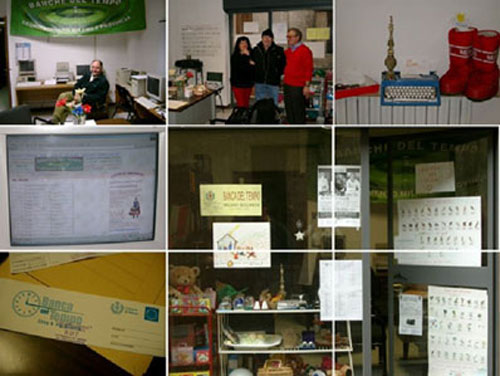BANCO DEL TEMPO/TIME BANK

An association through which people can exchange their spare time as a form of mutual help.
Key Innovation
Linking people according to their needs. People from different background can meet each other not for sharing common ideals but for fulfilling mutual needs.
Problematic background and context
In big European cities such as Milan, many people need different kinds of help and assistance. People sometimes can find solidarity in their own neighbourhoods but it’s really difficult that problems can be solved in a professional way. A lot of people is available to offer some of their time to help the others but, at the same time, the shyness in asking for help and the incapability to give it back, in some way, can represent a limitation. Barter solutions like the Time Bank are emerging in this context. The solution analyzed was born in 1999 and it’s localized in Niguarda, an area rich with civil society associations and cultural centres. Around the Niguarda Hospital there are also a lot of elderly and lonely people.
Solution description
Time Bank manages people’s spare time and competences and convert them in something to exchange with others. Every activity, help or good has a price in hours. People can ask for someone to solve them a problem and pay back with their own time instead of money. Time Bank’s mission is to put people in contact and find who can answer the needs of someone else. When somebody receives a service or help they have a debt equivalent to the amount of hours spent. They can cover it by offering something that cost the same time, or if more, they will get hours credited in their account. People join the association by filling a form in which they declare what they need and then what they could offer in exchange. The request is then put in the Time Bank’s list of announcements and communicated to all the members through a web site, a weekly e-mail and a paper note posted in the main center for the people without a personal computer.
Timeframe
The Time Bank of Niguarda started in 1999
Development phase
Diffusion:
The Time Bank is a highly diffused solution all around the world and also operates in different ways. The idea to create a network among different Time Banks in the same city is very important and it would allow to use the difference between the centers as a resource to solve more problems and to link more people.
Maturity:
This solution has been tested for sufficiently long time and there are different examples all around the world as a referiment. It works well but it’s not really optimised: the success is most of all due to the dedication of people who work for the Time Bank but, there is not a a great deal of organization in terms of archiving files or using a computer system. At the same time there is not enought comunication about this service.
Revenue/costs model
The Italian low (n°53/2000) says that local Councils can support and promote the constitution of Time Banks. The Council, then pays for the rent and all the bills for its maintenance, whereas the Time Bank’s coordinators have to present a monthly report on what they have done. Every member of the organization staff works for free. With the money of the registrations (14 Euros a year per member) they pay for office materials.
Social evaluation
The Time Bank is a very intelligent solution that gives great benefits to the society. People can receive help but, most of all, everyone can find something to give to the others in exchange. If in a volunteer association the help comes from only one direction, here it’s mutual and everyone has the same value in terms of what he can offer.
Environmental evaluation
At the Time Bank sales markets, people bring their old stuff and can buy them paying it with their hours. In some way, they teach that every old and unused object can turn into something positive for the others instead of being thrown away. Products exchanged in the bank can have their life expanded: the use of tools (i.e. drillers) are intensified if shared by many people while services are exchanged.
Economical evaluation
The Time Bank can improve a family economy, making them saving money trough the other members’ help. Claudia, for instance, saved a lot of money moving to her new flat with the help organized by the Time Bank but, this money saved has also been converted in something useful that she has done for other people. In some way, the money is less important and gives place to something more valuable: solidarity.
Authors
Alessandra Ciampalini, Ates Ergin / Politecnico di Milano / Italy